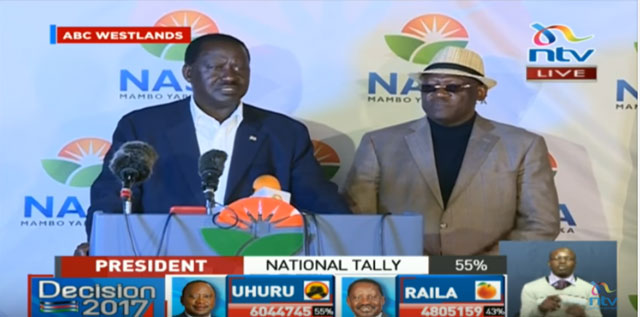
ODINGA: The system has failed. This is basically the computer that is voting.
Nairobi, Kenya | AFP | Kenya’s main opposition candidate Raila Odinga said on Wednesday that he rejected the preliminary results of Tuesday’s presidential election, which show President Uhuru Kenyatta with a substantial lead.
With more than 11 million ballots counted, Kenyatta was ahead with 55 percent of the vote against Odinga’s 44 percent, a difference of more than 1.1 million ballots, according to results released by the electoral commission (IEBC).
Odinga called the results “fake” at a press conference early Wednesday morning (see full statement bottom) and said the IEBC hadn’t produced documents that could prove the authenticity of the tallies.
“The system has failed,” Odinga told reporters. “This is basically the computer that is voting.”
The contest between Odinga and Kenyatta — old foes who previously faced off when Kenyatta was first elected in 2013 — was always expected to be close, and emotions have been running high after a bad-tempered campaign marred by opposition claims of a plot to rig the vote.
Odinga, 72, is taking his fourth and likely final stab at the presidency. He claims the elections in 2007 and 2013 were stolen from him.
He has repeatedly questioned the validity of the polls, and occasionally claimed that he would only lose this year’s election if it were rigged.
He levelled similar allegations of fraud after the 2007 general election, which degenerated into months of ethnic and political violence that left 1,100 people dead and displaced 600,000.
(1/2) Briefing on the 2017 Presidential Election: WE GOT THEM #PresidentialResultsKe pic.twitter.com/NOxd4UWxW3
— Raila Odinga (@RailaOdinga) August 9, 2017
(2/2) Briefing on the 2017 Presidential Election: WE GOT THEM #PresidentialResultsKe pic.twitter.com/yRuDV8dWBk
— Raila Odinga (@RailaOdinga) August 9, 2017
We know some persons gained entry into the IEBC Election Management Database & took over the mandate of Kenyans to choose leaders.
— Raila Odinga (@RailaOdinga) August 9, 2017
The commission would like to appreciate the Kenyans who showed up in large numbers to vote and would be urged to maintain the peace
— IEBC (@IEBCKenya) August 9, 2017
“The official results are derived from form 34A , and form 34B”- Chairman , Wafula Chebukati
— IEBC (@IEBCKenya) August 9, 2017
“We have set up a desk where all the Chief agents can come and verify all the Form 34As.” Chairman, Wafula Chebukati
— IEBC (@IEBCKenya) August 9, 2017
Presidential agents have been given access to all polling station results ie Forms 34A’s, as they are uploaded and a public access link made
— IEBC (@IEBCKenya) August 9, 2017
Presidential agents have been given access to all polling station results ie Forms 34A’s, as they are uploaded and a public access link made
— IEBC (@IEBCKenya) August 9, 2017
“As a commission we shall come up with a methodology to verify the allegations made on hacking.” -Chairman, Wafula Chebukati
— IEBC (@IEBCKenya) August 9, 2017
“As of 9 A.M today, we had received 28,000 form 34A’s. We expect much more as the day goes by” CEO, Ezra Chiloba
— IEBC (@IEBCKenya) August 9, 2017
In the event that there is discrepancy between the hard copy results and the electronic results, the hard copy signed by agents is final
— IEBC (@IEBCKenya) August 9, 2017
First elected in 2013, Kenyatta is standing for a second term.
Tensions in the country rose earlier this month when the tortured and strangled body of Chris Msando, a key administrator of a biometric voting system IEBC said would guard against fraud, was found on the outskirts of the capital Nairobi.
Referring to his belief that the results are being tampered with, Odinga said, “we fear that this is the precise reason why Mr. Chris Msando was assassinated.”
IEBC commissioner Roslyn Akombe said an unspecified political party objected to the release of the results, “but as a commission we decided that as part of the commitment we made to the voters and the Kenyan people, transparency and accountability are part of them.”
“This is why, as a commission, we have decided we will continue to display the results,” she said.
To win Kenya’s presidency in the first round of voting, a candidate must score a majority of the votes nationwide and at least a quarter of ballots in a 24 of the country’s 47 counties.
Counting is considered the most sensitive step of the electoral process in a country with a history of post-poll violence.
NASA statement #ElectionsKE #Decision2017 pic.twitter.com/1V63Jar2cB
— Henry Truman™ (@RealHenryTruman) August 9, 2017
RELATED STORY
LIVE: Kenya election results #ElectionsKE from @IEBCKenya https://t.co/CcCnEyiSPQ pic.twitter.com/QbsJBwz6i1
— The Independent (@UGIndependent) August 8, 2017
 The Independent Uganda: You get the Truth we Pay the Price
The Independent Uganda: You get the Truth we Pay the Price



